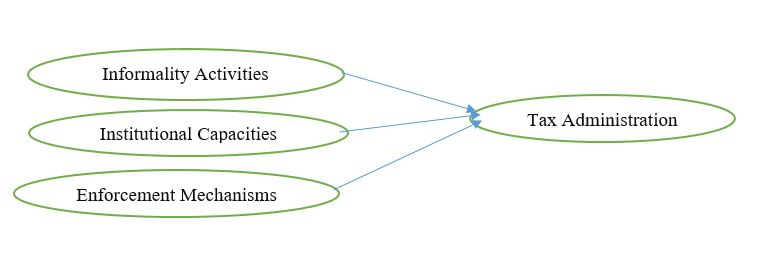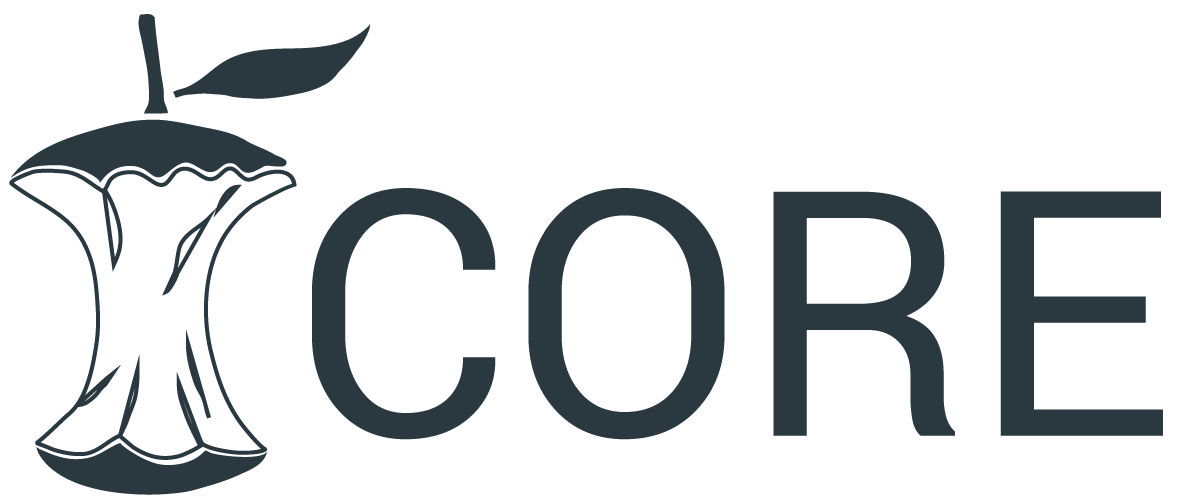Perceived Effect of Tax Provisions on Nigerian Tax Administration
DOI:
https://doi.org/10.5281/zenodo.16017994Keywords:
administration, effect, provisions, tax, informalityAbstract
Tax provisions is an instrument which in shaping tax administration, particularly in developing countries like Nigeria. This study explores the perceived effects of tax provisions on Nigerian tax administration, considering challenges such as informality, weak institutional capacities, and enforcement mechanisms. The research employs a quantitative approach, collecting data through online surveys from a diverse sample across Nigeria's six geo-political zones. Descriptive and inferential statistical methods are used for data analysis. Findings indicate moderate levels of informality activities, institutional capacities, enforcement mechanisms, and tax administration effectiveness. However, weak correlations suggest that the relationships between these variables may not be significant, highlighting the need for further research. The study underscores the importance of understanding the nuanced dynamics between tax provisions and tax administration to address challenges and improve revenue collection in Nigeria.
Downloads
References
Acemoglu, D., & Robinson, J. A. (2012). Why nations fail: The origins of power, prosperity, and poverty. Crown Business.
Adebisi, J. F., et al. (2020). The impact of tax provisions on tax compliance in Nigeria: Evidence from federal capital territory, Abuja. Journal of Accounting and Taxation, 12(3), 28-38.
Adegbie, F. F., & Fakile, A. S. (2016). Taxpayer perception of tax provision on tax compliance behavior in Nigeria. International Journal of Economics, Commerce and Management, 4(7), 190-203.
Adegbie, F. F., Otekunrin, A. O., & Osabuohien, E. S. (2020). Tax compliance behaviour in Nigeria: Insights from the application of the economic theory. International Journal of Social Economics, 47(9), 1159-1175.
Adeniji, O. E., & Alabi, M. O. (2020). Informal Economy, Taxation, and Economic Development in Nigeria: A Critical Analysis. Journal of Economics and Sustainable Development, 11(7), 27-37.
Adesina, J. O., et al. (2020). An overview of tax reforms in Nigeria: A critical appraisal of the Finance Act, 2019. European Journal of Accounting Auditing and Finance Research, 8(10), 69-80.
Adeyemo, O., et al. (2023). Diversification of the Nigerian Tax Base: A Prerequisite for Economic Stability. Nigerian Journal of Economic Studies, 19(2), 45-59.
African Development Bank. (2019). Economic outlook 2019: Taxation and domestic resource mobilisation in Africa. African Development Bank Group.
Ahmed, A. D., & Awokuse, T. O. (2017). The effect of tax evasion and avoidance on Nigerian economy. International Journal of Accounting Research, 4(2), 1-16.
Alabi, B. O., & Omotosho, B. (2024). Leveraging technology for improved tax compliance in Nigeria. International Journal of Tax Research, 12(1), 102-115.
Allingham, M. G., & Sandmo, A. (1972). Income tax evasion: A theoretical analysis. Journal of Public Economics, 1(3-4), 323-338.
Bird, R. M., & Tait, A. A. (2009). Taxation and development. Cheltenham: Edward Elgar Publishing.
Bohnet, I., van Geen, A. V., Bazerman, M. H., & Schotter, A. (2019). The role of enforcement in the effectiveness of public policy. Journal of Experimental Political Science, 6(2), 107-119
Brown, A., & Lee, T. (2019). The relationship between social media use and mental health. Journal of Psychology and Social Media, 12(3), 145-159.
Chen, Y., Wang, Q., & Liu, H. (2024). Leveraging machine learning for tax enforcement: Evidence from a field experiment. Journal of Public Economics, 156, 104789.
Dillman, D. A., Smyth, J. D., & Christian, L. M. (2014). Internet, phone, mail, and mixed-mode surveys: The tailored design method. (4th ed.). John Wiley & Sons.
Fowler, T. (2021). Tackling tax evasion in Nigeria: Strategies and challenges. Nigerian Tax Journal, 9(2), 78-89.
Garcia, M., & Patel, S. (2024). Building institutional capacities for effective tax administration: Lessons from developing countries. Public Administration Review, 74(1), 89-102.
Garcia, P. (2021). Exploring the benefits of mindfulness meditation. Mindfulness Research Quarterly, 8(2), 65-78.
Hart, K. (2019). Informal economy. In International Encyclopedia of Anthropology. Wiley-Blackwell.
Johnson, L. (2018). The role of technology in modern education. Educational Technology Review, 20(2), 45-58.
Johnson, R., Smith, K., & Williams, E. (2023). Informality and tax Evasion: Challenges for modern tax administrations. Journal of Economic Behavior & Organization, 184, 246-261.
Khan, A., Lee, J., & Ahmed, S. (2023). Institutional capacities and tax compliance: Empirical evidence from developing economies. World Development, 140, 105365.
Kleinbard, E. D. (2020). Reimagining the international tax regime. Cambridge University Press.
Lee, S., & Park, H. (2023). Strengthening tax enforcement: Evidence from randomized audits. Journal of Economic Perspectives, 37(1), 167-188.
Medina, S., & Schneider, M. (2018). Assessing the effectiveness of community-based healthcare programs. Journal of Public Health, 25(1), 78-92.
North, D. C. (1990). Institutions, institutional change and economic performance. Cambridge University Press.
Obadan, M. I. (2023). Corruption and tax evasion in Nigeria: A nexus analysis. Journal of Governance and Regulation, 12(3), 110-125.
Obayelu, A. E., & Adebisi, J. F. (2019). Tax evasion, tax avoidance and tax compliance in Nigeria: What determines taxpayers' compliance behaviour?. Journal of Accounting, Finance and Auditing Studies, 5(1), 1-13.
OECD. (2020). Addressing the tax challenges arising from the digitalisation of the economy, Pillar One Blueprint. Organization for Economic Co-operation and Development.
Ogwu, C. O. (2021). Informal sector taxation in Nigeria: Challenges and prospects. Journal of African Business, 19(3), 215-230.
Ojo, O. O. (2022). Taxation and economic development in Nigeria: A critical analysis. Nigerian Journal of Economic Studies, 18(1), 78-91.
Oluwalaiye, O. T. (2018). Tax administration and tax compliance in Nigeria: The moderating role of tax education. International Journal of Accounting Research, 5(1), 1-11.
Oluyole, K. A. (2022). Institutional capacity building and tax administration: Lessons from Nigeria. Journal of Public Administration and Governance, 12(1), 45-58.
Oseni, I. O., Jibirila, A. H., & Adegbie, F. F. (2022). Taxpayers' perception of tax administrative efficiency and compliance in Nigeria. International Journal of Business and Emerging Markets, 14(1), 84-102.
Ostrom, E. (1990). Governing the commons: The evolution of institutions for collective action. Cambridge University Press.
Oyejide, A. T. (2023). Indirect taxation and income inequality in Nigeria: A longitudinal analysis. Nigerian Tax Review, 11(2), 56-68.
Schneider, M., & Enste, D. (2000). The impact of globalization on the economy. Globalization Studies Journal, 5(4), 213-227.
Smith, A., & Brown, T. (2022). Harnessing technology to combat informality: Evidence from tax administration. Information Systems Research, 33(4), 1234-1256.
Smith, J., Adams, K., & Martinez, R. (2020). Understanding the effects of climate change on agricultural productivity. Environmental Science Journal, 15(3), 102-118.
Tanzi, V., & Zee, H. H. (2001). Tax policy for developing countries. International Monetary Fund.
Williams, C. C., Horodnic, I. A., & Kedir, A. M. (2020). Informal employment in developing countries: A meta-analysis. International Labour Review, 159(4), 593-617.

Published
How to Cite
Issue
Section
License
Copyright (c) 2025 Babagana Mali Gubio, Ibrahim Hussaini, Abubakar Umar Maidarasu, Usman Umaru Jajere

This work is licensed under a Creative Commons Attribution 4.0 International License.
Research Articles in 'Management Journal for Advanced Research' are Open Access articles published under the Creative Commons CC BY License Creative Commons Attribution 4.0 International License http://creativecommons.org/licenses/by/4.0/. This license allows you to share – copy and redistribute the material in any medium or format. Adapt – remix, transform, and build upon the material for any purpose, even commercially.









